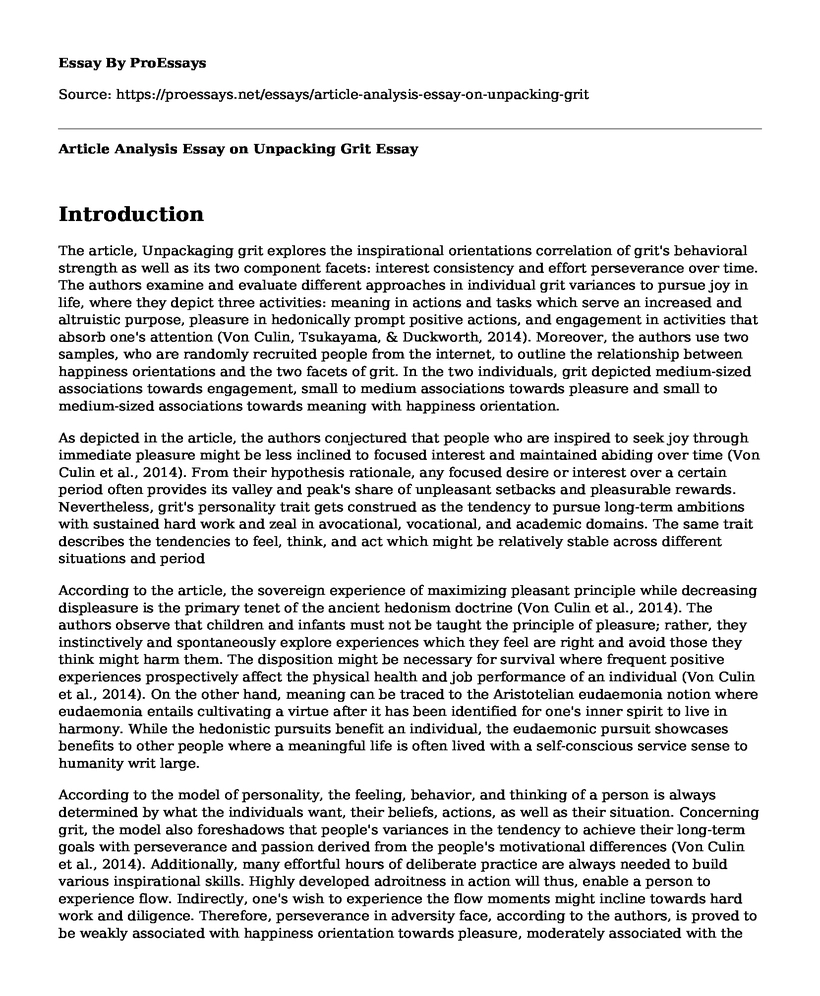Introduction
The article, Unpackaging grit explores the inspirational orientations correlation of grit's behavioral strength as well as its two component facets: interest consistency and effort perseverance over time. The authors examine and evaluate different approaches in individual grit variances to pursue joy in life, where they depict three activities: meaning in actions and tasks which serve an increased and altruistic purpose, pleasure in hedonically prompt positive actions, and engagement in activities that absorb one's attention (Von Culin, Tsukayama, & Duckworth, 2014). Moreover, the authors use two samples, who are randomly recruited people from the internet, to outline the relationship between happiness orientations and the two facets of grit. In the two individuals, grit depicted medium-sized associations towards engagement, small to medium associations towards pleasure and small to medium-sized associations towards meaning with happiness orientation.
As depicted in the article, the authors conjectured that people who are inspired to seek joy through immediate pleasure might be less inclined to focused interest and maintained abiding over time (Von Culin et al., 2014). From their hypothesis rationale, any focused desire or interest over a certain period often provides its valley and peak's share of unpleasant setbacks and pleasurable rewards. Nevertheless, grit's personality trait gets construed as the tendency to pursue long-term ambitions with sustained hard work and zeal in avocational, vocational, and academic domains. The same trait describes the tendencies to feel, think, and act which might be relatively stable across different situations and period
According to the article, the sovereign experience of maximizing pleasant principle while decreasing displeasure is the primary tenet of the ancient hedonism doctrine (Von Culin et al., 2014). The authors observe that children and infants must not be taught the principle of pleasure; rather, they instinctively and spontaneously explore experiences which they feel are right and avoid those they think might harm them. The disposition might be necessary for survival where frequent positive experiences prospectively affect the physical health and job performance of an individual (Von Culin et al., 2014). On the other hand, meaning can be traced to the Aristotelian eudaemonia notion where eudaemonia entails cultivating a virtue after it has been identified for one's inner spirit to live in harmony. While the hedonistic pursuits benefit an individual, the eudaemonic pursuit showcases benefits to other people where a meaningful life is often lived with a self-conscious service sense to humanity writ large.
According to the model of personality, the feeling, behavior, and thinking of a person is always determined by what the individuals want, their beliefs, actions, as well as their situation. Concerning grit, the model also foreshadows that people's variances in the tendency to achieve their long-term goals with perseverance and passion derived from the people's motivational differences (Von Culin et al., 2014). Additionally, many effortful hours of deliberate practice are always needed to build various inspirational skills. Highly developed adroitness in action will thus, enable a person to experience flow. Indirectly, one's wish to experience the flow moments might incline towards hard work and diligence. Therefore, perseverance in adversity face, according to the authors, is proved to be weakly associated with happiness orientation towards pleasure, moderately associated with the same direction towards meaning, and strongly associated towards engagement.
The pursuit of meaning and engagement, as opposed to pleasure, is made up of grit's motivational correlates. On the other hand, the wishes for purpose and meaning in life contribute to the two facets of courage. The desire towards flow and engagement facilitate sustained ability over a certain period, whereas immediate pleasure's urge undermines focused and continued interests over time (Von Culin et al., 2014).
Reference
Von Culin, K. R., Tsukayama, E., & Duckworth, A. L. (2014). Unpacking grit: Motivational correlates of perseverance and passion for long-term goals. The Journal of Positive Psychology, 9(4), 306-312. Doi: 10.1080/17439760.2014.898320
Cite this page
Article Analysis Essay on Unpacking Grit. (2023, Feb 15). Retrieved from https://proessays.net/essays/article-analysis-essay-on-unpacking-grit
If you are the original author of this essay and no longer wish to have it published on the ProEssays website, please click below to request its removal:
- When Photographs Create False Memories Essay
- Essay Sample on Adult Aging
- The Effectiveness of Group Therapy on Self-Esteem of Teenage Girls - Essay Sample
- Article Analysis Essay on Treatment Burden for Chronic Illness
- Essay on Unlock Your Goal-Setting Power: Motivation & Self-Regulation
- Essay on Overcoming Resistance to Change: An Example From Kegan and Lahey (2001)
- Essay Example on Sons and Daughters: Comparing Family Roles, Body Structures & Rewards







